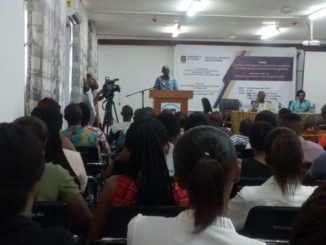Continuation of Confessions of a Politician (Part 2)
But we have all been lumped together to share equally the power to contribute. This process has culminated in simple minds having the same privilege as those who have consciously disciplined themselves with the regimen to be conscious of their surroundings and those who have studied the science of politics. Including those with a clear awareness of our socioeconomic state and how to remedy these anomalies. Since there are more of such ignorance in our society, selfish politicians could always whip them with sentimental messages, if not material things and money, and win their emotions instead of their reasoning to vote in one way or the other.
When some politicians are bereft of realistic policies that could be sustained, they would resort to striking the ethnocentric or religious cords especially when they know they have plenty of such weak minds in their constituencies.

Mr and Mrs everybody will be swayed to follow such a cheap call. Ultimately the politicians get to polarize the voting population into fragmented groups of tribesmen and haters. And those, who do not understand the science of politics begin to see the other groups of people as real enemies. Mr. and Mrs. Everybody do not know the point where ideological differences end and where the love of humanity begins. And for as long as the selfish politicians are concerned, that’s all that they have wanted. So they can always play heads against each other to entrench themselves in power, or work against the incumbent party.
The executive arm of government. The legislature. The judiciary. These are what constitutes governance in a democracy. They were set up to check and balance their activities. All for the benefit of the citizens from whom members of these governing bodies are selected and elected. The media wants to be part of the arms of government, but they lack the discipline to stay neutral in order to serve the people. They are like the delegates in the constituencies, they have personalized their positions. They are supposed to be our eyes ears and mouths. But they have blended with the politicians and the people in a way that is very difficult to tell where their interests are apart from themselves.
The executive proposes, the legislator debates and the judge interprets. In other words, the President brings up a policy, the parliamentarians debate if it’s beneficial and makes a statute to support it. The judge guides its implementation through the interpretation of the law.
Therefore as citizens, our prayer should be to rather have an intelligent, perspicacious, compassionate, and well-meaning Parliamentarians to represent us in parliament. One who would see him/herself as an integral part of those he/she represents. One whose major concern would be the welfare and the development of the constituency he/she hails from. For they are there because of the welfare of the constituents in their constituencies. And nothing else.
Since we send them there to represent our interest, we should have been able to go about our businesses with no qualms at all. Rest assured that everything will go on smoothly for us because we have been well represented in the governing structure. And then by close of every day, retire to our various homes in peace and tranquillity. Eat, drink, and stretch our legs to enjoy our repose. Wake up the next day to continue whatever legitimate activities would culminate in our pursuit of happiness and satisfaction in life.
We have documented a variety of laws and precedents and provisions into a binding document which we have all agreed to abide by its spirit and letter. We call this the constitution of the land. Where our rights, liberties, and privileges have been enshrined to protect and enhance our freedom to enjoy life, associations, verbal and written expression, and be protected plus more.
Parliament is the summary of the constituents of the people within our sovereign nation. Even though the people may have voted for the President who is the head of the executive, viz, the government, the people would also represent themselves and their interests through the elected candidates to the House of Parliament against any unruly or whimsical fantasies of the one they voted for as President. The human heart has the tendency to become addicted to autocratic power when unchecked. So we needed to be at the same venue where the President we voted for would come and account to us before getting our permission to execute new policies.
Even if the government wields power in parliament based on having majority representatives there, the people’s prayer must be to have a principled and constituency minded Parliamentarians. Who would ultimately determine whether what comes from the President of the ruling government is beneficial to the people or not?
Cabinet members are constituted by the President to help him with his ideas in the performance of his stewardship of the country, to help guide his vision which the people shared in, toward its implementation. For that should have been the reason why they voted for him or her into office.
The caucus constitutes of Parliamentarians belonging to the government in power. Call them the ruling caucus. The opposition parties too may have their caucuses. When the President walks in with a proposition to his cabinet, the leader of parliamentary affairs in cabinet brings that proposition before the caucus for deliberations and determination.
Looking at it this way, it’s not the President, but our Parliamentarians, that we should always be mindful of when it comes to our wellbeing. While the President is the father of the country, the parliamentarians are the mothers of our constituencies. Their collaborative effort give birth to developments in our various constituencies. Thus the MP is the one the constituency should be majorly concerned about. Because our welfare and enjoyment of rights are dependent on the competence of the MP. For us to enjoy good roads, good drainage systems, lights in dark corners at night, plus more, the MP must be competent and sensitive to the wellbeing of the constituents in the constituency.
This means that the most important cog in the wheel of the democracy we are practicing is the electoral college vote at the constituency level for a Member of Parliament.
Certain people are elected as delegates and given the mandate to elect a competent candidate to represent the constituents of the constituency in parliament. These delegates in our various constituencies are the ones who actually vote for the development of projects in our constituencies, not the MPs.
By the choice of the delegates the fate of our constituencies, and for that matter, the nation is determined.
So now, who are the delegates? How are they selected or elected? What goes into the qualifications to become a delegate? What must motivate his or her voting pattern? Should their interest be in the development of the constituencies or their personal idiosyncrasies?
Observing what happens lately when electing our parliamentary candidates, it’s not far fetched to say that the delegates in our constituencies have usurped the benefits that are due to the constituents in the constituencies. The infrastructure developments of our constituencies benefit all those who are residents there. Instead of being mindful of development projects that will serve the people in the constituency, delegates put before themselves their petty personal interests in determining who gets elected to represent the whole constituency in parliament.
Meanwhile, the ratio of the delegates numbers to the population of the entire constituency is a mismatch. Additionally, there is a clear case of transference of prejudice from an outgoing delegate to an incoming one when their election time is due. This anomaly spawned hatred and entrenched divisiveness amongst the executives and the delegates they smuggled into the constituency voting structure. So at all times, there would be a faction of the executives with their loyal delegates that would always go looking for an interested party to come and contest the incumbent, irrespective of the incumbent’s developmental works ongoing in the constituency. It would always be so because some of the delegates will be greedy, ignorant, petty, traitors, or downright idiots.
They would debate on the proposition to ascertain its merit first amongst themselves before presenting it to the floor of the Parliament, hoping to win the consent of diverse contributions from the opposing sides. In other words to get the overwhelming support of members from all parties. The parliament as a house will then vote to determine whether to consider it or jettison it based on its beneficial contents. And here the majority side, if they shared a common interest, would influence it passage into a statute. All for the benefit of the people they represent.
Permit for much harsher words. But when delegates will judge candidates based on the opinion of others, in other words, if delegates would allow the prejudice of other delegates to be transferred into their heads, but not based on their understanding of the role they were elected to play for the constituency, and by which the fate of the constituents in the constituency would ultimately be determined, then they deserve even harsher names.
If a member of parliament who is really developing the constituency fails to honor a delegate’s personal request to do a favor, or if a delegate’s call is not answered, and by which the MP becomes his or her victim, that he or she won’t vote for, ladies and gentlemen, is such a delegate not ignorant of why he/she is a delegate? And yet these scenarios are rampant in determining who they vote for. Just because of their petty personal gains, the constituents in a constituency must suffer from bad roads, dark alleys at night, bad drainage systems, lack of health facilities, lack of adequate classrooms, etc.
MPs are not elected to satisfy the petty wants and fickle fantasies of delegates. They are elected to work for the development of their constituencies. The entire constituency shouldn’t suffer because some few delegates think they have been denied their petty wants and needs.
Usually, the group that would lead a candidate to come and contest would feel obliged to occupy executive positions in the constituency due to the benefits that accrue there. The candidate will be obligated to return their favor of bringing him or her to lead the constituency. If the elected member of parliament begins to question their merits and credibility to the positions they want to occupy, he or she may become a one time MP. Because they will begin to gang up against him, while smiling with him or her and collecting money and goodies from the MP behind their vile cheeks. So the problem of square pegs in round holes begins at the constituency level of politics. Just by virtue of being there for some time, even if they are incompetent, or incapable of reasoning, the MP can’t do anything about it, except to endorse them to contest. Support them to lure weak heads to vote for them, so they remained there to perpetuate an entrenched agenda.
The concern here is that by their choices the quality of parliament is determined as well. And that is where the bane of our problems begin. The quality of parliament should not be based on how much money a person has, or how insensitive to humanity a person may be, or mere book cleverness and titles of individual aspirants. Or more so, the ignorance, greed, prejudices, and personal petty interest of some few scoundrels who call themselves delegates.
It should be based more on the commitment to philosophical principles that are human growth-oriented, having strong substantive views and commitment to discipline that could see to the implementation of their theories. They should be having strong
character to endure vicissitudes. They should be visionaries and willing to sacrifice bodily pleasures for the betterment of the people in their various constituencies. If these were the motivating factors, those who don’t have such qualities won’t even venture to contest for the seat.
These qualities are supposed to be seen and also felt in aspirants even before they would have raised their heads to contest for the parliamentary seat in their respective constituencies. So the challenge here is, in the absence of acquainting themselves with grand literature with which to interpret their environment from a lofty perspective, what’s going to be the yardstick with which delegates will use to determine judgment? Is it going to be MONEY as we are seeing?
Most of the delegates have had their most fatal tendencies strengthened by their own lowly cravings. They believe in the here and now. Most, if not all of them are incapable of looking beyond their personal interest. What may concern most of them is the inflation of their tumbled ego. It’s all about the survival of their petty selves. And not about the development of their constituencies. It’s all about the money, to the extent that they call the primaries election their cocoa season. In times like these, they will milk from all the aspiring candidates and vote for the one who gave them more cash. Oh my goodness!
If anyone of them happens to have a bone to pick with an aspirant for example, their vote goes to the opposite candidate. These decisions emerge because they felt their egos have been pricked by the aspirant. That means the development of a constituency is dependent on the whimsical feeling of delegates toward an incumbent or aspiring candidate. If an aspiring candidate pandered to their capricious mood, he or she wins their votes.
If the development of a constituency is going to be determined by fickle moods of delegates, then we shan’t have a parliament worthy of its representation of the kind of people we expect to be there. We need a special kind of a head and a heart to occupy the seat in parliament. That kind of character which has been built by the exertion of simple yet profound thoughts. A character that has become the fruition of personal hard work. An enigma to common thinking.
The solution to solving the money issues, or more appropriately, bribing delegates to woo them during primaries election may be to expand the electoral college of the delegates, with mechanisms to forestall the infiltration of parties who may have ulterior motives to interfere. That would also make it impossible for a contestant to influence their voting patterns because of their sheer number. Here, if a person hasn’t singularly distinguished his or her name, she or he won’t be merited to be elected to the house of legislation to represent a people. We should work to have reason, compassion, vision, the sense to sacrifice oneself, hardworking and disciplined characters in our parliament. All we need to do is to consult with the few amongst us that love to pursue wisdom for its own sake for the roadmap.
My humble opinion
–
By Julius Hamenoo



